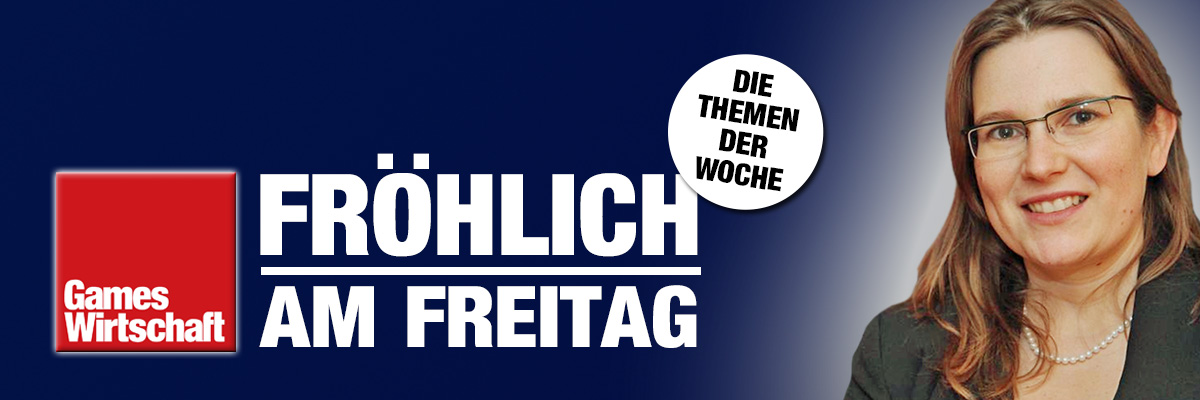Advertisement
How to generate billions in sales with games – without developing a single game: This is how the shovel seller business works.
Dear GamesWirtschaft reader,
Dear GamesWirtschaft reader,
Brannan Street runs two and a half blocks away from the Moscone Center in San Francisco – where the Game Developers Conference (GDC) takes place every year. It is named after an American businessman who was one of the richest people in California during the gold rush in the mid-19th century and went down in history as the state's first millionaire.
However, Samuel Brannan did not achieve his wealth by laboriously digging for nuggets in the murky waters. But rather by supplying the soldiers of fortune who arrived in droves with the necessary tools and everyday goods – pans, hoes, shovels, clothes, provisions. According to legend, he is said to have acquired all the shovels in the wide area in order to then sell them off to the gold seekers in the mines at moon prices.
Advertisement
Since then, we have occasionally heard the nice advice from stock market traders that one should not invest in gold diggers, but in shovels. In other words, in shares of those companies that benefit directly and indirectly from a boom – without having to take any risk themselves. Just like Lieferando: The agent earns handsomely from every pizza delivered, but doesn't have to spread Pomodoro sauce on flatbreads or turn on the stone oven.

In the digital sector, the invention of the smartphone has led to a few gatekeepers dominating the shovel business of entire industries: Check24, Trivago and Booking for hotel bookings, Apple and Google for the app stores, the search engines and social media networks anyway. Retailers such as Amazon, Otto, MediaMarkt and Kaufland have long since opened their virtual shelves to third-party sellers who sell their goods there.
The most important shovel sellers in the games industry are – of course – the big platforms: Sony (PlayStation), Microsoft (Xbox), Nintendo (eShop) and Valve (Steam). Up to 30 percent of sales made in the PlayStation Store, Steam or in-game purchases in an app remain with the middleman as a commission – a lucrative business model because it works regardless of seasonal peaks. Already presented in 2021 the Wall Street Journal firmly: “Apple doesn't make video games. But it’s the hottest player in gaming.”
If you know about these connections, the €5.8 billion game turnover in Germany is of course put into perspective: Because of the €3 billion that was generated in this country with smartphone and tablet games in 2023, Apple and Google accounted for almost €1 billion – income that is usually recorded directly in places of longing such as Luxembourg or Ireland. Largely unmolested from Lindner's finance ministry.
The model of Nintendo, Sony and Microsoft goes even further because they earn both from their own products and services and from commissions from game manufacturers – i.e. sales fees that large publishers such as Electronic Arts, Ubisoft & Co. pay as well as small studios.
Example: In the 2023 Christmas business, Sony Interactive sold almost 90 million full-price games – but 'only' 16 million of them were company-owned blockbusters like Marvel's Spider-Man 2. Others contributed by far the largest chunk of sales – in the form of games, game currencies, expansions and in-game items.
This circumstance may also provide an explanation for the change in strategy that Microsoft and Sony have made. Both are struggling with the sluggish demand for their game consoles, whose recommended retail price remains a stable €550 – three and a half years after their market launch. There doesn't seem to be a real need for substantial price reductions, especially since the devices are already highly subsidized. Microsoft even accepts that hardware sales figures will continue to collapse in the coming months, as shown in the latest quarterly report.
So the software has to fix it – a new 'showcase' is planned for June 9th. The shooter brand is likely to play an important role Call of Duty play. In the course of the Activision-Blizzard takeover battle, the US company apparently, after a tough struggle, agreed to have the successful series also take place with its arch rivals Sony Interactive and Nintendo in the next ten years. There were previously concerns from competition watchdogs that Microsoft could Call of Duty seal off. In reality, it won't have taken too complex an Excel spreadsheet to calculate the delta between such exclusivity and potential full-price and in-game sales.
In general, exclusivity is increasingly going out of fashion. Xbox boss Phil Spencer recently raised the rhetorical question of who would be helped if the PS5 hit Helldivers 2 is not available on Xbox. The Microsoft manager should not only have his own customers' leisure activities in mind, but also the bare numbers in the form of lost commissions that would arise with a sales price of around €35.
Conversely, Microsoft lets an Xbox exclusive title like Sea of Thieves recently also launched in Sony waters. As a result, at the beginning of April, 7 (!) of the 25 highest-grossing games in the PlayStation Store came from Microsoft, as CEO Satya Nadella smugly dictated to the analysts in the block.
Which shows: It is in the increasing interest of all parties that games and brands are available on as many platforms as possible. Commission income can hardly be earned more easily and with less risk. Motto: Why go through the hassle of digging for nuggets yourself when you can scoop them with shovels?
Analogous to the California gold rush, not everything that glitters is gold in the games business: There is dissatisfaction in the industry about what many market participants believe are unjustifiably high fees charged by quasi-monopolists. Epic Games has been waging a bitter legal battle against Apple and Google for years – with the aim of avoiding or at least alleviating the 30 percent tariff.
At GDC 2024 – not far from the Brannan Street mentioned above – Epic Games recently presented plans for its own app store. There should only be a commission of 12 percent – 88 percent would remain with the developer, analogous to the Epic Games Store. And Apple is also moving, albeit under gentle pressure from the Digital Markets Act (DMA), with which the EU Commission wants to curb the market power of the digital giants.
So far, in addition to app stores, Brussels has primarily focused on operating systems, social networks, messengers and services such as YouTube. But at least when looking at Steam's market shares, sooner or later the question could arise as to why a shovel seller like Valve is allowed to continue cashing in unmolested from gold-digging indie studios.
We wish you a nice weekend
Petra Fröhlich
Editor-in-chief of GamesWirtschaft
Always Fridays, always free: Subscribe to the GamesWirtschaft newsletter now!
GamesWirtschaft on social media: LinkedIn ● Facebook ● X ● threads ● Bluesky
